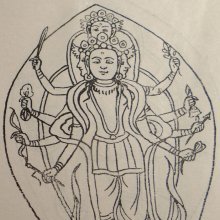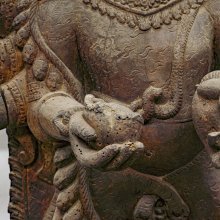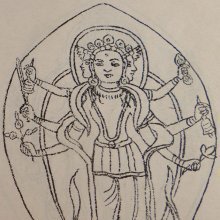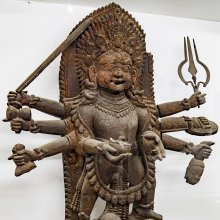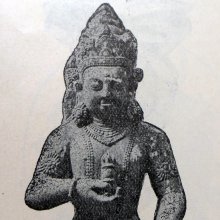Ghanta, Ghaṇṭā, Ghaṇṭa, Ghamta, Ghanṭa, Ghanṭā: 44 definitions
Introduction:
Ghanta means something in Buddhism, Pali, Hinduism, Sanskrit, the history of ancient India, Marathi, Jainism, Prakrit, Hindi, biology. If you want to know the exact meaning, history, etymology or English translation of this term then check out the descriptions on this page. Add your comment or reference to a book if you want to contribute to this summary article.
Ghanta has 42 English definitions available.
Images (photo gallery)
(+21 more images available)
Languages of India and abroad
Sanskrit dictionary
[Deutsch Wörterbuch]
Source: Cologne Digital Sanskrit Dictionaries: Böhtlingk and Roth Grosses Petersburger WörterbuchGhaṇṭa (घण्ट):—
1) adj. neben aghaṇṭa, dhaṭin (ghaṭin?), ghaṇṭin und caṇḍikaghaṇṭa Beiw. von Śiva [Mahābhārata 12, 10377. 10419.] [Harivaṃśa 14884.] ghaṇṭī f. Beiw. der Durgā [Mahābhārata 4, 188.] Viell. eine hellklingende Stimme habend. —
2) m. ein best. Gericht [Śabdakalpadruma]; vgl. matsyaghaṇṭa . Nach [Wilson’s Wörterbuch] : a sort of sauce, vegetables made into a pulp with water, turmeric, mustard seeds and capsicums. —
2) f. ā a) Glocke [Mahābhārata 3, 14531. fg.] [12, 5350] (loha). [?13, 871. Arjunasamāgama 2, 3. Rāmāyaṇa 2, 67, 17. 89, 12. 5, 9, 21. 6, 35, 11. 106, 24. Suśruta 2, 385, 18. Pañcatantra 89, 10. 228, 22. 229, 13. 15. Varāhamihira’s Bṛhajjātaka S. 42(43), 7. 85, 23. 86, 107. Hiouen-Thsang I, 52. 431. WASSILYEW 211.] ghaṇṭātāḍa die Glocke schlagend [Manu’s Gesetzbuch 10, 33.] Am Ende eines adj. comp. f. ā [Mahābhārata 14, 1758.] śaktimaṣṭaghaṇṭām [Rāmāyaṇa 6, 80, 32.] Die Form ghaṇṭī haben wir in kṣudraghaṇṭī Glöckchen [Medinīkoṣa r. 152.] — b) Name verschiedener Pflanzen: α) = ghaṇṭāpāṭali [Śabdaratnāvalī im Śabdakalpadruma] — β) Sida cordifolia und rhombifolia. — γ) Uraria lagopodiodes (nāgavalā) [Rājanirghaṇṭa im Śabdakalpadruma] — δ) Achyranthes aspera (apamārga) [Ratnamālā 40.] — ghaṇṭā Glocke und ghaṭa Topf können wohl ursprünglich identisch sein, wie wir denn auch in vielen compp. sowohl diese beiden Wörter als auch kumbha (= ghaṭa) mit ghaṇṭā wechseln sehen; vgl. ghaṭābha und ghaṇṭābha, ghaṭodara und ghaṇṭodara, kumbhīvīja und ghaṇṭāvīja, kumbhinīvīja und ghaṇṭinīvīja .
--- OR ---
Ghaṇṭa (घण्ट):—[Z. 6 lies
3) Stenzler 2]). —
4) m. Nomen proprium eines Dānava (neben Nighaṇṭa) [Kathāsaritsāgara 121, 229.] — Vgl. kālaghaṇṭayoga, mahāghaṇṭī, mukhaghaṇṭā .
--- OR ---
Ghaṇṭa (घण्ट):—
2) a) [Spr. (II) 2158.]
Source: Cologne Digital Sanskrit Dictionaries: Sanskrit-Wörterbuch in kürzerer FassungGhaṇṭa (घण्ट):——
1) m. — a) Beiname Śiva's. — b) *ein best. Gericht. — c) Nomen proprium eines Dānava. —
2) f. ā — a) Glocke. Am Ende eines adj. Comp. f. ā. — b) eine Art Cymbel [Saṃgitasārasaṃgraha 198.] — c) *Bignonia suaveolens. — d) *Sida_cordifolia_oder rhombifolia [Rājan 4,103.] — e) *Uraria lagopodioides [Rājan 4,106.] — f) *Achyranthes aspera. —
3) *f. ī Glocke in kṣudra.
Sanskrit, also spelled संस्कृतम् (saṃskṛtam), is an ancient language of India commonly seen as the grandmother of the Indo-European language family (even English!). Closely allied with Prakrit and Pali, Sanskrit is more exhaustive in both grammar and terms and has the most extensive collection of literature in the world, greatly surpassing its sister-languages Greek and Latin.
See also (Relevant definitions)
Starts with (+42): Ghamtagopura, Ghamtamani, Ghamtarave, Ghamtaruti, Ghantaarava, Ghantabha, Ghantabija, Ghantadhara, Ghantadharini, Ghantagara, Ghantaghara, Ghantaghosha, Ghantaka, Ghantakaran, Ghantakarna, Ghantakarnahrada, Ghantakarnakritavishnustuti, Ghantakarnamahavira, Ghantakarnamahavirastotra, Ghantakarnaprakarana.
Ends with (+40): Adhoghanta, Aghanta, Aghoraghanta, Anughamta, Birudaghanta, Candaghanta, Candikaghanta, Candraghanta, Caturghanta, Caugghamta, Caughamta, Chandaghanta, Chitraghanta, Citraghanta, Deulaghanta, Devalaci Ghanta, Dhanurghanta, Ekaksharanighanta, Gajaghanta, Galaghanta.
Full-text (+186): Ghantarava, Ghantavadya, Ghantatada, Ghantika, Ghantakarna, Ghantasvana, Ghantatadana, Ghantanada, Ghantashabda, Ghantin, Ghantapatali, Ghantaka, Ghantapatha, Ghantabha, Ghantodara, Ghantaphalaka, Candikaghanta, Ghanteshvara, Mukhaghanta, Nirghanta.
Relevant text
Search found 41 books and stories containing Ghanta, Ghaṇṭā, Ghaṃṭa, Ghaṇṭa, Ghaṃṭā, Ghāṇṭa, Ghamta, Ghanṭa, Ghanṭā; (plurals include: Ghantas, Ghaṇṭās, Ghaṃṭas, Ghaṇṭas, Ghaṃṭās, Ghāṇṭas, Ghamtas, Ghanṭas, Ghanṭās). You can also click to the full overview containing English textual excerpts. Below are direct links for the most relevant articles:
Varahi Tantra (English Study) (by Roberta Pamio)
Chapter 29 - The worship of Caṇḍikā < [Summary of the Vārāhī Tantra]
Chapter 12 - The Dhyānas (supports for the meditation) of the Goddess < [Summary of the Vārāhī Tantra]
Chapter 28 - Durgāpūjā (the worship of Durgā) < [Summary of the Vārāhī Tantra]
Puranic encyclopaedia (by Vettam Mani)
The Skanda Purana (by G. V. Tagare)
Chapter 57 - Ghaṇṭeśvara (ghaṇṭa-īśvara-liṅga) < [Section 2 - Caturaśīti-liṅga-māhātmya]
Chapter 8 - Prākārakarṇa’s Story < [Section 2 - Kaumārikā-khaṇḍa]
Chapter 83 - Greatness of Yogeśvarī (Yoga-īśvarī) < [Section 1 - Prabhāsa-kṣetra-māhātmya]
Chaitanya Bhagavata (by Bhumipati Dāsa)
Verse 3.4.458 < [Chapter 4 - Descriptions of Śrī Acyutānanda’s Pastimes and the Worship of Śrī Mādhavendra]
Verse 3.4.454 < [Chapter 4 - Descriptions of Śrī Acyutānanda’s Pastimes and the Worship of Śrī Mādhavendra]
Verse 2.23.429 < [Chapter 23 - Wandering about Navadvīpa On the Day the Lord Delivered the Kazi]
Tattvartha Sutra (with commentary) (by Vijay K. Jain)
Verse 4.14 - The divisions of time (kāla-vibhāga) < [Chapter 4 - The Celestial Beings]
Garga Samhita (English) (by Danavir Goswami)
Verse 5.13.18 < [Chapter 13 - The Arrival of Sri Uddhava]
Verse 1.2.44 < [Chapter 2 - Description of the Abode of Śrī Goloka]
Verse 3.1.21 < [Chapter 1 - The Worship of Śrī Girirāja]
Related products

